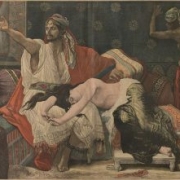Aramaic – even on Facebook
Aramaic – even on Facebook
In honor of Easter 2014
The Christian world will resonate this Sunday, Palm Sunday, with the word “hosanna” (Matthew 21:9, Mark 11:9, John 12:13). In Jerusalem you’ll hear the crowds shout it as they make their way down the Mount of Olives. The word is a form of the two Hebrew words hoshi‘ana, which appear in Psalm 118:25 and beseeches God to save us.
The word “hoshana,” which is related to hosanna, is Aramaic, the spoken language of the Jews of Jesus’ time. There are other Aramaic words that have survived in the New Testament like “talitakumi,” Jesus’ words that revived Jairus’ daughter “little girl [little lamb] arise” (Mark 5:41). The heroes and heroines in my novel, “The Scroll” spoke it. Well, at least they spoke it to each other when we aren’t reading; when we are, they speak English so we can understand them…) and in some scenes I tried to imagine the conquering Roman soldiers twisting their tongues around it.
Some people speak Aramaic in the Middle East to this day. In fact, I once guided an American Christian tourist, originally from Syria, who spoke the language and very much enriched the experience of the tour group I was guiding by explaining many things to us. But truth be told, the thing I remember most about him is losing him for an hour in Nazareth after he resolved – without telling anyone – to seek out other speakers of his native tongue. At the Seder table of my daughter Nili’s Kurdish-Jewish in-laws, her husband Amichai’s grandfather conducts the Passover service in Aramaic. You can also hear the ancient sounds of Aramaic in the liturgy of the Syriac Orthodox Church (at the Church of St. Mark in Jerusalem, for example), in the Jewish prayer praising God for the lives of the departed, the Kaddish, and in many ancient Jewish sources.
On a much lighter note, as reported in Haaretz earlier this week. an anonymous Israeli high schooler has posted a Facebook page in Aramaic. It was reported that he even translated the word “Facebook” into Aramaic. In literal Hebrew it would be Sefer Ha-Panim (although no Hebrew speaker would call it that – we just call it “Feisbuk”). In Aramaic it sounds similar to the Hebrew, as Aramaic often does, and so it became “Sifra de-anpin.” The page has garnered 2,000 followers since it was posted earlier this month. You can find something else on that Facebook page you’ve no doubt always wanted to have – a translation of the 1970s hit “Country Roads.” They’ve reportedly sent out a call for suggestions for an Aramaic translation for the ubiquitous “LOL.”
Any suggestions?



